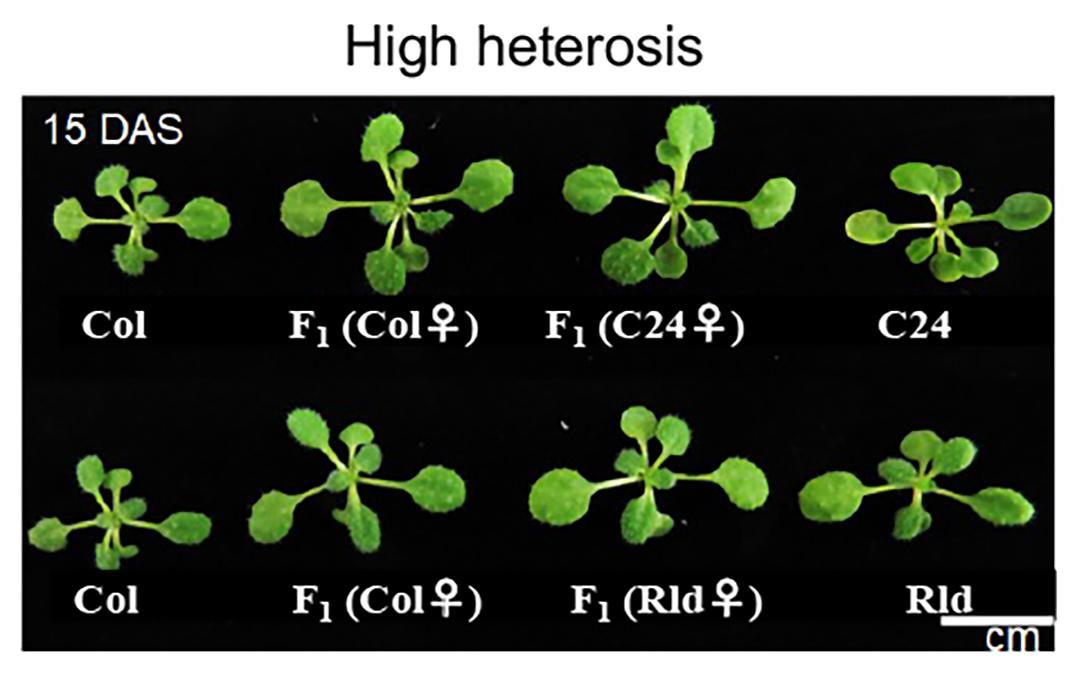Research News
Increase in Biomass Due to Changes in F1-Hybrid Metabolite

In this study, several Arabidopsis lines were grouped according to the level of heterosis, or hybrid vigor, a trait superior to parents through cross-breeding. A research group led by the University of Tsukuba compared the metabolites of the groups showing each level of heterosis. As a result, they observed that the number of intermediate metabolites produced in the tricarboxylic acid (TCA) cycle changed depending on the expression level of the heterosis.
Tsukuba, Japan—Heterosis is a phenomenon in which F1 hybrids, generated by crossing different species or strains, exhibit more vigorous growth than their parents. F1 hybrids are grown for many crops on the market today. However, although heterosis has been known for more than 100 years, its mechanism has not yet been completely understood.
In this study, the researchers used a total of 202 Arabidopsis lines as model plants. The plants were grouped according to the level of heterosis on the basis of the phenotypic analysis of flowering time, seed size, seed germination time, and 15-day postgermination fresh weight. The comparative analysis of heterosis expression levels between high- and low-heterosis combinations revealed that the production of intermediate metabolites of the TCA cycle (carbon metabolic circuit in mitochondria) was specifically altered in heterosis combinations that exhibited high levels of heterosis.
We believe that understanding the molecular mechanisms of heterosis might contribute to the efficient development of F1 breeding methods and high-biomass crops.
###
This work was supported in part by the Tsukuba Innovation Arena (TIA) collaborative research program "Kakehashi" (TK18-07 and TK19-062) to H.S. from TIA, and by the Grant-in-Aid for Scientific Research (C) (22K05928) and Funding Program for Next Generation World-Leading Researchers (NEXT Program) (GS018) to H.S. from JSPS. This research was also supported by the "Sustainable Food Security Research Project" in the form of an operational grant from the National University Corporation, Japan. Q.T.N Le is supported by a doctoral scholarship from The Ministry of Education, Culture, Sports, Science, and Technology (MEXT), Japan.
Original Paper
- Title of original paper:
- Morphological and metabolomics profiling of intraspecific Arabidopsis hybrids in relation to biomass heterosis
- Journal:
- Scientific reports
- DOI:
- 10.1038/s41598-023-36618-y
Correspondence
Professor SHIBA Hiroshi
Institute of Life and Environmental Sciences, University of Tsukuba
Assistant Professor SUGI Naoya
Kihara Institute for Biological Research, Yokohama City University
Professor KUSANO Miyako
Degree Programs in Life and Earth Sciences, Graduate School of Science and Technology, University of Tsukuba
Professor SUZUKI Yutaka
Department of Computational Biology and Medical Sciences, Graduate School of Frontier Sciences, The University of Tokyo
Related Link
Institute of Life and Environmental Sciences








